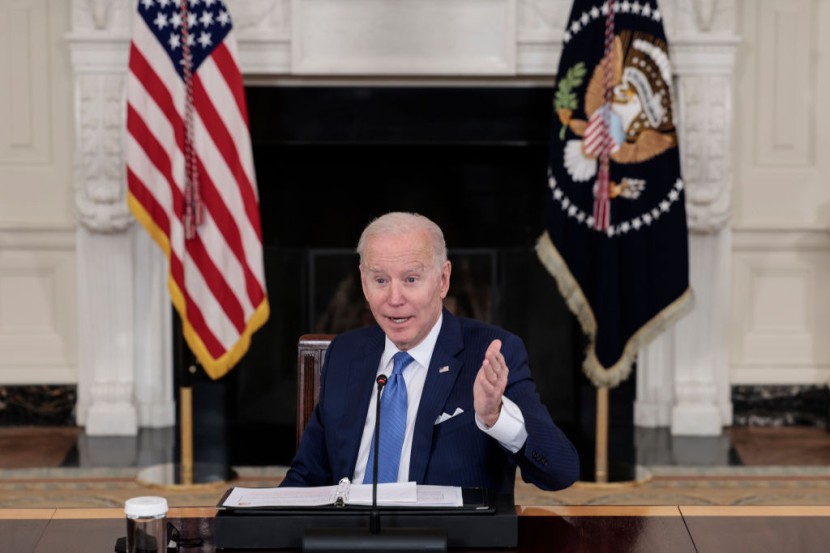
Just hours after official statistics indicated that inflation hit a fresh 40-year high in January, President Joe Biden declared that Democrats are "near" to passing their big social spending measure, intensifying resistance to the $2 trillion proposals.
In a speech in Culpeper, Va., when annual inflation hit 7.5 percent, Biden presented the questionable spin about his agenda's status, which centrist Sen. Joe Manchin (D-WV) said was an additional reason to avoid large new spending.
Biden Touts Senate's Nearly Passing the Spending Bill
After receiving a hostile reception from demonstrators, the president addressed. "Don't sniff me," a 7-year-old girl held up in front of Biden's motorcade, while people waved anti-Biden banners such as "Let's Go, Brandon," "FJB," "Biden Sucks," and "Build Crack Better" in front of Biden's convoy.
Biden briefly noticed the new federal statistics indicating increasing inflation in January, but he sought to use it to sell his blocked spending package, which would subsidize child care and home health care, among other things, as well as a sales pitch for his stalled spending bill.
Although the Congressional Budget Office estimates that the plan will add $367 billion in unmet expenditure, Biden asserted that his package is "completely paid for" with additional taxes and hence will not increase inflation. Manchin accused fellow Democrats of deceptive "gimmicks" that undercounted the bill's actual cost by having new programs continue for shorter periods than anticipated additional revenue when the House passed the massive package with a $2.2 trillion price tag in November, according to New York Post.
Meanwhile, the inflation rate in the United States increased to 7.5 percent in January, reaching a 40-year high, indicating that consumer price inflation is unlikely to ease anytime soon and putting greater pressure on the Federal Reserve to act. In the first month of the New Year, the consumer price index increased by 0.6 percent, owing to significant increases in rent, food, and energy prices. The increase was more than the 0.4 percent increase predicted by Wall Street. The cost of living has risen by 7.5 percent in the last 12 months, making it the highest since February 1982.
The Federal Reserve is on pace to raise interest rates for the first time in four years in March to attempt to stifle inflation. The January CPI will likely heighten the central bank's urgency, perhaps compelling the Fed to contemplate a half-percentage point rise in its benchmark short-term interest rate.
According to the government, a different gauge of consumer inflation that excludes volatile food and energy costs increased by 0.6 percent last month. Over the last 12 months, the so-called core rate has increased to 6% from 5.5 percent. Since August 1982, this has been the highest level. The Fed may need to move quickly and decisively to prevent inflation from worsening. Higher interest rates would assist in keeping consumer demand in check while also signaling to Wall Street that the central bank is serious about doing business.
However, few experts expect the Fed will be able to keep inflation below 3% by the end of the year. In December, the central bank predicted that in 2022, the rate of inflation would drop considerably. Businesses are still suffering from severe labor and supply shortages, as well as shipping delays and higher transportation costs, as price rises have extended across the sector, as per Market Watch.
Read Also : Katya Adler Says Europe's Unity Is Not Real Due To Events Revealing Divisions Amongst Allies
Joe Manchin Cites Rising Inflation
On Thursday, Sen. Joe Manchin slammed the notion of extra federal spending, claiming that the government should focus more on reducing deficits and combating inflation. He also warned that the US debt would continue to rise past $30 trillion, calling it "historic" and chastising Congress for seeking to increase spending.
President Joe Biden's delayed social and climate package is unlikely to pass anytime soon, according to Manchin's remarks. At the end of December, the House-approved deal was stabbed in the back by the hardline West Virginia Democrat. Democrats won't be able to approve any package if they don't have his support. There have been few signs of progress toward a lower cost in recent weeks.
Instead of crafting a bipartisan elections reform plan in combination with a year-long government funding bill, Manchin has committed a large amount of time. Biden's spending plan was not discussed with Manchin, and he told reporters on Tuesday.
Some Democrats feel that allocating a portion of the money in the Democrat-only measure to debt reduction may persuade Manchin to support a future bill. The Montana senator, Sen. Jon Tester, recently told Insider that he thinks Manchin "would be more likely" to support a plan like that.
"Every day to ensure any government spending is targeted and thoughtful - because a lean, efficient government helps avoid price hikes," Arizona Democrat Kyrsten Sinema said in a statement on rising inflation, adding that she works "every day to ensure any government spending is targeted and thoughtful," Business Insider reported.
Related Article : Joe Biden Shellacked by Approval Rating Like Donald Trump's Prompting Indicators of a Red Wave Coming in Midterms Sweeping Democrats
© 2026 HNGN, All rights reserved. Do not reproduce without permission.








